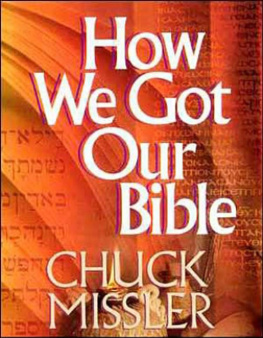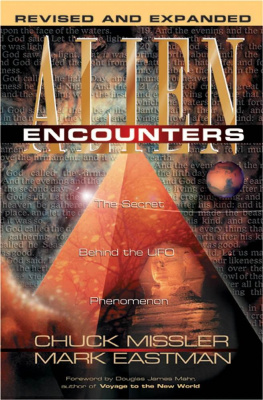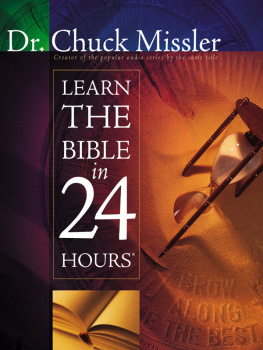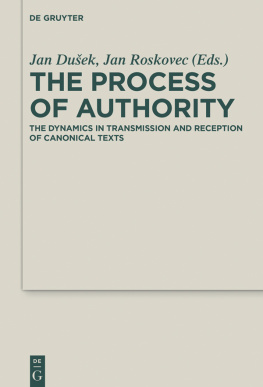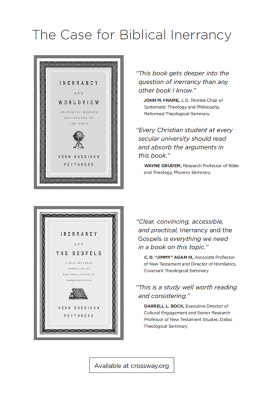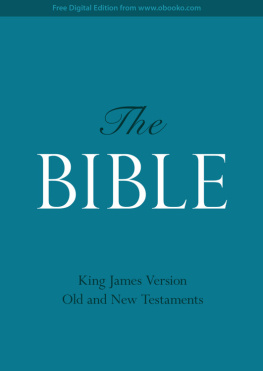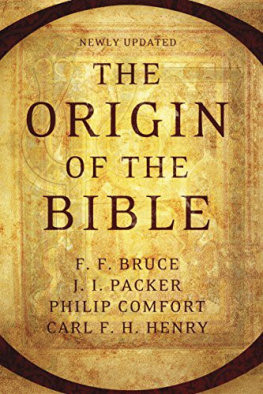Chuck Missler - How We Got Our Bible
Here you can read online Chuck Missler - How We Got Our Bible full text of the book (entire story) in english for free. Download pdf and epub, get meaning, cover and reviews about this ebook. year: 2016, publisher: Koinonia House Inc., genre: Religion. Description of the work, (preface) as well as reviews are available. Best literature library LitArk.com created for fans of good reading and offers a wide selection of genres:
Romance novel
Science fiction
Adventure
Detective
Science
History
Home and family
Prose
Art
Politics
Computer
Non-fiction
Religion
Business
Children
Humor
Choose a favorite category and find really read worthwhile books. Enjoy immersion in the world of imagination, feel the emotions of the characters or learn something new for yourself, make an fascinating discovery.
- Book:How We Got Our Bible
- Author:
- Publisher:Koinonia House Inc.
- Genre:
- Year:2016
- Rating:5 / 5
- Favourites:Add to favourites
- Your mark:
- 100
- 1
- 2
- 3
- 4
- 5
How We Got Our Bible: summary, description and annotation
We offer to read an annotation, description, summary or preface (depends on what the author of the book "How We Got Our Bible" wrote himself). If you haven't found the necessary information about the book — write in the comments, we will try to find it.
How We Got Our Bible — read online for free the complete book (whole text) full work
Below is the text of the book, divided by pages. System saving the place of the last page read, allows you to conveniently read the book "How We Got Our Bible" online for free, without having to search again every time where you left off. Put a bookmark, and you can go to the page where you finished reading at any time.
Font size:
Interval:
Bookmark:
By Dr. Chuck Missler

How We Got Our Bible
Copyright 2016 Koinonia House Inc.
Published by Koinonia House
P.O. Box D
Coeur dAlene, ID 83816-0347
www.khouse.org
ISBN: 978-1-57821-640-6
All Rights Reserved.
No portion of this book may be reproduced in any form whatsoever without the written permission of the Publisher.
All Scripture quotations are from the King James Version of the Holy Bible.
Table of Contents
Introduction
Then said I, Lo, I come: in the volume of the book it is written of me,
Psalm 40:7
The Bible is the single most important book of all time, selling an estimated 5 billion copies. It has been translated into 349 languages, and 2123 languages have at least one book of the Bible. At the same time, the Bible is scrutinized and attacked more than any other book in the world. It has been outlawed, confiscated and burned at different times and places in history. It has been smuggled into jail cells and across borders. John Huss was burned at the stake for teaching from the Bible as the final authority for the Church over any earthly church rulers. William Tyndale was strangled and burned for translating the Bible into English. Every week, millions of Christians gather to discuss its words, even as higher critics attempt to explain it through the lens of metaphysical naturalism. What we believe about the Bible can be the most important, central issue in our lives, threading its way into the very fabric of who we are and how we live each day.
Where did the Bible come from? Why do we believe its origin is supernatural? Who defined the canon of Scripture? Most importantly, is the Bible the Word of God? You and I are gambling our eternity on the answer to that last question. Why do we believe God is the author of the Bible, and can each one of us defend that belief? Dark times are on the horizon, and it is increasingly important that we learn to live by faith. Where we place our faith fully depends on how we view the Scriptures.
Over the past 50 years, I have been privileged to travel around the world and talk to people about the Word of God and the saving power of Jesus Christ. Of course, I always get a lot of questions about the Bible. People ask me: Chuck, how do I know the Bible is the Word of God? How do I know the Bible is true and accurate? How did we even get the Bible we have today? Which version of the Bible is the best?
The purpose of this little book is to deal with these question and to assure its readers that the Bible is reliable, accurate, and applicable to the world today. Through these pages, we will explore some lesser-known facts about the Bible and take common knowledge about its pages to a deeper level. We will defend the authenticity of the Bible as the Word of God so that you, dear reader, might equip others to do the same. The Word of God is a miracle the Lord has given to us so that we may know Him better and live our lives according to Truth. May God bless each one of us as we absorb this material and press onward to live it out every day.
The Nature of Reality
Within recent years, many members of Protestant denominational churches and the Roman Catholic Church have turned away from the Bible as the fully inspired Word of God. We hear arguments that the Bible contradicts itself or that it contradicts the truths of modern culture and science. Many people say the Bible contains the Word of God, but cannot be relied on to be the Word of God in all its entirety. This is a key issue. Is the Bible really true?
Ultimately, there are two basic world views we can hold. One view regards everything we experience as the result of some cosmic accident. In the Beginning there was nothing, and then it exploded. The other view is that everything we experience is the deliberate result of a Creator. Of course, there are numerous variations on each of these views, but each of us must decide where we will place our trust. Each of these world views holds possible solutions to the biggest puzzles of life:
- Who am I?
- Where did I come from?
- Where am I going?
- To whom am I accountable?
It is ultimately important that we find the true answers to these questions.
You and I live in a time of rebellion and self-worship. Parental and marital authority are challenged in the homes and courts. Political, academic and ecclesiastical authority are challenged across the land.
Now the serpent was more subtle than any beast of the field which the LORD God had made. And he said unto the woman, Yea, hath God said, Ye shall not eat of every tree of the garden?
Genesis 3:1
Here, near the very beginning, we are introduced to Satan, the serpent, our adversary, and the first thing we see him do is question Gods Word. Yea, hath God said ?
His next step is to slander Gods character with straight denial. Ye shall not surely die , ( Gen 3:4 ). Thus, Satan encouraged the rejection of Gods authority at the very beginning, while humanity was yet in its infancy. Eve failed to trust God, Adam followed her in directly disobeying what God had told him, and humankind lost everything as a result.
We find the same pattern today. A number of social indicators deteriorate rapidly after 1963 in the United States. There were fewer than 10 births per 1000 unmarried teen women (ages 15-19) prior to 1947, and between 1955 and 1964, the number remained steadily between 15 and 16. Divorce rates escalated, families broke up, crime rates rose, and the acceptance of homosexuality became commonplace. As of 2015, more than 58 million unborn children have been murdered in the United States because they were considered inconvenient. Fifty-eight million. That is nearly ten times the number of Jewish victims in the Holocaust.
Its noteworthy that in 1963, as a result of the combined court cases Abington School District v. Schempp and Murray v. Curlett , the U.S. Supreme Court banned school-led reading of the Bible and recital of the Lords Prayer. These court cases alleged to uphold the principles of freedom and human dignity, yet the end result of turning our backs on God has been destruction and misery. As we choose our own way over Gods way, were losing everything. There is little dignity in divorce or high crime rates.
It is ironic that the elements we most desire in life are rarely attained through our own weak wisdom and fleshly desires. After trying our own methods, over and over again we have had to learn that we experience human dignity and true freedom only through moral obedience and accountability to the Creator who fashioned human beings for a high spiritual destiny.
Skeptics have brutally attacked the Bible throughout history, and during the past century it has become popular among intellectuals to regard the Bible as merely a conglomeration of Jewish writings. Its considered respectable to dispute the authorship of the books of the Bible and to disregard fulfilled prophecy as events reported after-the-fact.
In 1898, Hermann Schultz, professor of Theology at the University of Gottingen, declared:
Of the legendary character of the pre-Mosaic narrators, the time of which they treat is a sufficient proof. It was a time prior to all knowledge of writing, a time separated by an interval of more than four hundred years, of which there is absolutely no history.
Yet, the patriarchal accounts in the Bible have been corroborated by archeological evidence. The common skeptical assertions thrown about in academic circles can be shown to be short-sighted.
Font size:
Interval:
Bookmark:
Similar books «How We Got Our Bible»
Look at similar books to How We Got Our Bible. We have selected literature similar in name and meaning in the hope of providing readers with more options to find new, interesting, not yet read works.
Discussion, reviews of the book How We Got Our Bible and just readers' own opinions. Leave your comments, write what you think about the work, its meaning or the main characters. Specify what exactly you liked and what you didn't like, and why you think so.

